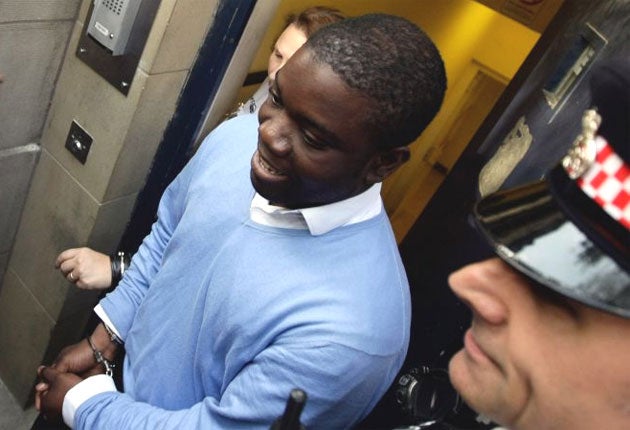Scandal in the City
In the dog-eat-dog world of City trading, fortune tends to favour the brave, but one gambler took it too far

From earning an estimated £200,000 basic salary for trading fiendishly complicated bundles of seemingly unrelated financial assets, 31-year-old banker Kweku Adoboli faces charges that could land him up to 10 years behind bars.
Mr Adoboli is the Ghanaian-born, English boarding school-educated City high-flyer alleged to have lost UBS £1.3bn in bad financial bets from the Swiss bank's London offices – without his bosses noticing. He is said to have told his superiors of the losses on Wednesday, leading to his arrest in the early hours of Thursday.
Mr Adoboli wept as the charges of fraud and false accounting were read out at a 15-minute hearing on Friday. The son of a United Nations worker, he won a place on UBS's much sought- after graduate scheme.
Mr Adoboli's case and the details of his lavish existence underline the growing gap between the lives of the traders in the City and the average working – or jobless – people who surround them.
Mr Adoboli's flat in Whitechapel lies in the heart of Bethnal Green and Bow, one of the poorest constituencies in the country. While the trader reportedly earned more than £1m in salary and bonuses, the unemployment rate among his neighbours has risen by 7.5 per cent in a single year. The area, once a manufacturing hub, now records the 24th worst rate of unemployment in the UK.
Traditional manufacturing has shed more than 2 million workers since 1994, and some 300,000 since the most recent downturn. Mr Adoboli's colleagues, widely blamed for the recession, have lost a third as many jobs. While construction, manufacturing, retail and other sectors continue to struggle, the City has recovered: the biggest financial institutions are now earning more than they did before the crash. The average City salary is close to £80,000 – at least three times the national average wage.
After the panic come the recriminations. Now the most notorious alleged rogue trader since Nick Leeson, who destroyed Barings Bank with £827m of losses, it is perhaps fitting that Mr Adoboli has hired the same legal firm as Leeson, Kingsley Napley. UBS's heavyweight legal team is thought to be led by Herbert Smith partner Martyn Hopper. He previously held senior roles at the Financial Services Authority, the City watchdog that announced on Friday evening it was investigating how the UBS losses went undetected.
Mr Adoboli's boss John Hughes is already reported to have resigned, while a rival trader of what are known as exchange traded funds said that most banks had such strict controls in place that they can monitor their staff's every trade. Many in the industry believe some of those who traded with Mr Adoboli, the counter-parties, will be questioned.
Simon Morris, financial services lawyer at CMS Cameron McKenna, said: "It will be a three-dimensional investigation: the trader, his counterparties and his management. A trader doesn't operate in a vacuum. Was management aware? If not, why not?"
Last Monday, the Independent Commission for Banking (ICB) recommended ring-fencing high-street deposits from the risk-taking investment banking operations, which critics describe as being "casinos". There are concerns that the ICB report recommended giving banks as long as eight years to implement the reforms; plenty of time to water them down until they are virtually meaningless.
While the scandal should ensure ICB's government supporters do not let up – George Osborne and Vince Cable are keen to get chunks of the report on statute as soon as possible – little appears likely to change in the short term. The fees investment banks charge are returning to pre-crisis highs. A Thomson Reuters survey found that global investment banking fees stood at $48.9bn (£31bn) between January and June, the most expensive first half since 2007. And they still pay huge bonuses – Royal Bank of Scotland revealed in February that its bankers received £950m in such payments, despite a £1.1bn loss overall.
It's a safe bet that today, in a flat in an area where property prices have long ago pushed out manufacturing workers, some banker is working out new ways to profit from trading complicated bundles of seemingly unrelated financial assets.
Subscribe to Independent Premium to bookmark this article
Want to bookmark your favourite articles and stories to read or reference later? Start your Independent Premium subscription today.
